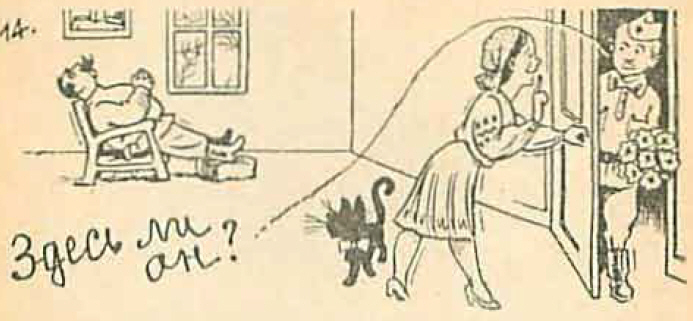| Russian for English speakers 14 |
 |
| Lesson 14 |
|
Russian |
Pronunciation & Comments |
English Английский |
|
36 - тридцать шесть |
36 - (tridcăt' chèsst') |
thirty six |
|
37 - тридцать семь |
37 - (tridcăt' s'èm') |
thirty seven |
|
38 - тридцать восемь |
38 - (tridcăt' vossiem') |
thirty eight |
|
39 - тридцать девять |
39 - (tridcăt' diéviĕt') |
thirty nine |
|
Четырнадцатый (14-й) урок |
(chetyrnadcătiy urok) |
Fourteenth lesson |
|
УРОК НОМЕР ЧЕТЫРНАДЦАТЬ (№14) |
(oorock nommĕr chetyrnadcăt') |
Lesson number fourteen (#14) |
| REVISION AND NOTES |
| Grammar. — As far as it is possible, we shall endeavour not to overwhelm you with grammatical rules. Our notes are indispensable explanations rather than rules. However, it shall be necessary, one day, to give you declension or conjugation tables etc.. |
|
| But we want first to prepare you for it, by scattering difficulties and
attacking them one by one, so that, once gathered together, they may not look unsurmountable to you. |
|
| May we hope that so far we have not subjected you to excessive work? | |
| 1 |
Interrogative form. |
| Вы говорите:
you speak. Говорите ли вы? do you speak? |
|
| Он здесь : he
(is) here. Здесь ли он? (is) he here? Давно ли он здесь? (has) he (been) here (a) long time? |
|
| Это вы: it
(is) you. Вы ли это? (is) it you? |
|
| Он дома: he (is) at home.
Дома ли он ? (is) he at home? |
|
|
Она у вас сегодня
: she is at your house to-day. |
|
| You see how supple and accurate a word
ли is in a sentence. The order of words, besides, is much less strict in Russian than in English. Do not expect to see the verb always preceded by the subject and followed by the object. |
|
| 2 | To be and to have. — The verb to be is omitted in the present indicative, and you are already used to it : |
|
я здесь,
I'm here ("I here"); |
|
|
However, the infinitive быть, to be is used : |
|
|
я
хочу быть там: I want to be
there. |
|
| We also have есть,
which corresponds to our "there is" but is seldom used except in the meaning of to have, in the phrase : у меня есть: to me or with me there is: I have |
|
|
The same : |
|
|
Do you remember that его,
him, to-him and её
her, to-her, |
|
| 3 |
Absence of predicate |
|
Мне трудно
: (it is) difficult for me ("to-me difficult").
|
|
| 4 | The ending in О
of adverbs is also that of the neuter. Without entering upon the question of genders — which, by the way, is quite simple. — let us remark in passing that the final о indicates the neuter; we met it only in слово (word) for nouns, and in это (this, it), a demonstrative. |
| 5 |
The letter Г
(gh) is sometimes sounded v, we saw it in
|
|
Tweested English Section
The Russian
spelling has been altered in 1918; Let us say once more that all we ask of you is to understand
the texts of the lessons and exercises |

